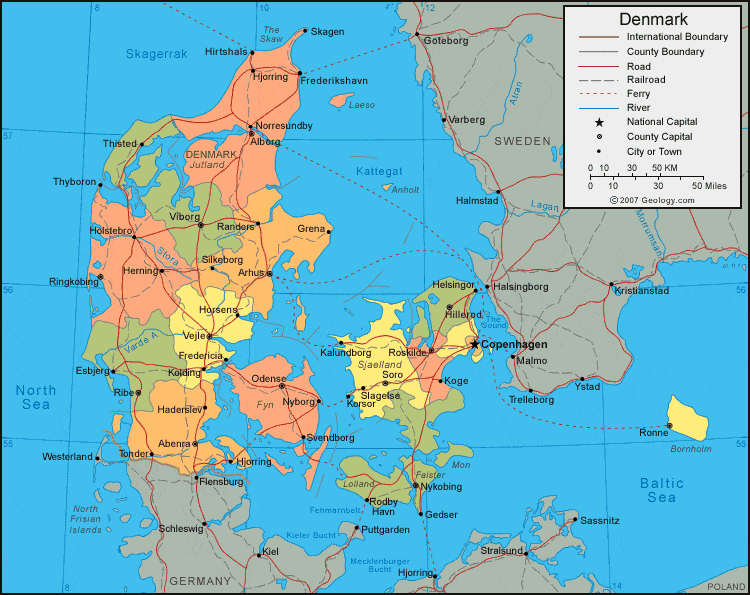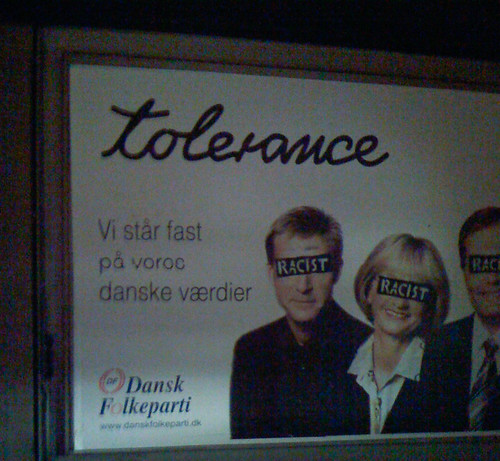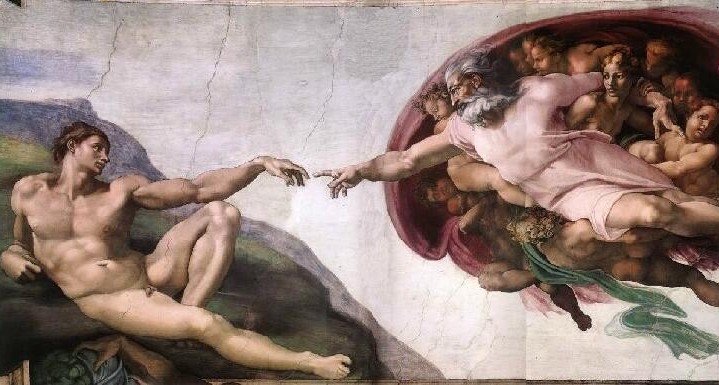Geographical Issues
Geographical data may appear irrelevant for an advertising analysis, nevertheless they are part of the culture of a nation, and represent a factor involved in shaping of consuming habits and comportamental models. They may prove helpful for the correct understanding of cultural features and issues.Denmark is a relatively small country (43.092 km2) with a population of cca 5 millions inhabitants, from which 6,8% immigrants and their descendants. There is only one terrestrial border – with Germany (68 km), the rest of the country is surrounded by seas. Denmark's territory includes a peninsula (Jutland) and cca 527 small islands connected by numerous bridges with a spectacular architecture and ferry-boat lines, a very well organized and comfortable transportation service, specific to Denmark and to other Scandinavian countries.
The relief is relatively uniform and flat, mostly hills and plains – the maximum altitude according to sources is 200m. The soil is generally poor; the main resources are the chalk, clays, other kinds of construction materials. In the North Sea there are small quantities of oil and natural gas. The fields are the main resource of the country covering 65% of its surface, while 12% is occupied by forests (according to the sources this territory was dramatically decreased at the beginning of the 19th century to only 3% and the present situation is due to a preservation ordere, various afforestation projects and to the environmental policy initiated by the Danish government cca 25 years ago), while the rest of 23% is represented by lakes, towns, roads.
Given the natural conditions mentioned above, Denmark is a predominantly agrarian country. Besides the resources represented by the fertile soil, a general believe is that „Children and young people are (…) Denamark's raw material" [5] and this belief has evident and positive consequences for the educational system. Counting on such human resources, education, commercial talent and inventivity, Denmark developed a series of industrial branches such as: information technology, biotechnology, software, food industry, environment protection and energy preservation technology (Denmark is world leader in wind mills energy). The seas surrounding the country allowed the development of fishing industry and naval constructions or services.
Danish economy is based on small and medium-size companies (77% of companies have less than 50 employees) and in the most typical organizational structure there is only one owner who often is both investor and manager. A very popular product category in Denmark seems to be food & beverages products. Danes love and prefer local products which are also researched world wide for their recognized qualities. It is relevant that a small country as Denmark is the 5th exporting country in the world for this category and the food sector seems to be the most developed branch of industry.
But the most important sector of the economy is the services area with cca 70% of the labour market, which is relatively similar to the rest of the Western countries. The main services categories are: tourism, naval transport, insurances, software, banking, entertainment, cleaning and maintenance.
Denmark is a constitutional monarchy with a unicameral Parliament (the Folketinget) composed of 179 members, elected every 4 years. Officially the chief of state (since 1972) is the Queen Margrethe II. The royal family is very popular in Denmark and Danish people seem to show a sincere sympathy for it and identify it as a very strong national symbol.
It is worth to mention the high participation to voting of the Danes – cca 90%, which reflects a deep and active involvement in political decisions and a very responsible social and civil attitude.
An essential component is the ideal of the Welfare state (Velførdsstat) which in Denmark takes the form of the Scandinavian model based on the principle that each member of the society has equal rights and access to social support and social benefits. The prize to pay for such availability of goods and services is the heavy system of taxation. The general attitude towards the government is positive and the population supports the system. An explanation for this respect for equality would be the sense of moral obligation: "they (Danes) share with others, if not gladly, then from a sense of moral obligation"[6] . Recently the difficulties in preserving this universalistic welfare state led to a tendency to distribute benefits especially to those whom are or have been active in the labour market, a tendency which in a way contrasts with the principle of equality specific to the universalistic welfare state.
Danish cultural features and values are connected in a network built on relations of interdependence. The consequence of living in a society where material and psychological benefits are accessible and tangible is the feeling of safety and comfort. "The Danish way of thinking: it is more sensible to have a secure life than to take big risks" [7] . Together with the sense of sharing and the sense of community, the feeling of securitysupports the ideal of the welfare state.
It is believed that only by compromise it is possible to preserve the welfare state and the prize to pay for comfort and security is the mediocrity, the fact of "not having the chance to do very much". The sense of community and of sharing is the base of the agreement and contribution to the welfare state and the heavy taxation system, which is also a way to level income differences; this participation is supported by the trust in the community and in the security granted by it.
As I have mentioned above human resources are believed to be the most important. Improving the educational system is among the main goals of the government. The topic is relevant as far as the school plays a role of cultural values mediation, being an instrument of children integration in the society. It is interesting to point out the three fundamental constituents of Danish school: "the non-authoritarian method, co-determination and equality – has at best resulted in the allocation of equal status to the general formative aspects of education in relation to the attainment of qualifications" [8] .
The title of the present system introduced in 1993 could be relevant – "the work-project" - thought as a tool for the development of social skills and the capacity to work together. Play and freedom are central parts of the daily routine. The principle of equalityapplies again: the distribution of children in classes is not based on their results or skills and for the first grades they don't receive marks. This is supposed to encourage them to develop self-confidence and the capacity of auto-evaluation. The relation between teacher and pupils is based on the same principle of equality and the teacher is not conceived as an authority in possess of knowledge or truth. "The Danes detest authority (…) there is no bowing and scraping to anyone in Denmark" [9] . The keywords for such system are closeness, informality, friendship, trust. "A high priority is given to the development of social behaviour" [10] . But again the prize is believed to be the mediocrity: "The price we pay for success is that `normality' spreads, and that the unusual and the extraordinary must take a back seat" [11] . It is also important to mention that for all levels education is tuition free and even private institutions of education can receive government subsidies.
Danish lifestyle is characterized by the fulfilment of social needs in a rather restrained circle: the family and a few close friends. Danes may appear "cold" or reserved but it is believed to be an attitude derived from respect for other’s privacy. Home(hjemme) seems to be a central notion for Danish lifestyle and many efforts and money are invested in making the house more comfortable (Denmark is a leader in industrial design) and hyggelige. "In the 1970s and 1980s the Danes have spent more time on achieving a higher housing standard than previously, and on equipping these homes with all new consumer durables which have appeared on the market" [12] . Danes like modernity and comfort; tradition is not back grounded but the presence of festivals or similar manifestations in traditional costumes does not occupy a significant place as in other European cultures.
Main attributes to characterize this lifestyle are: informal, relaxed, reluctant to extremes and tolerant with different lifestyle, and rather liberal in many senses. The success and the importance of feminist movement are relevant and so does the fact that, in 1989, Denmark has been the first country to approve homosexual marriage with equal rights. The stress on equality between women and men is stronger than elsewhere in Europe and the female labour market participation is the highest in the continent.
Hygge is considered a fundamental notion of Danish lifestyle, through which many aspects of personal life are approached from house decoration to everyday habits. Its national specificity is reflected by the difficulty of translating it into another language: usually is equated with "cozyness" or as another definition suggests "the warmth of successful informity" [13] . "It not only constitutes a lifestyle but it the country’s trademark. (…) It requires a specifically luxuriant atmosphere, as well as the ability to view life on a Danish scale; to prioritise small pleasures, to appreciate a get-together with soft lightning and candles. " [14] The same term brings together many notions such as: hospitality, friendship, closeness, the wish to make everybody feel good. Hygge as a social value may be linked again with the sense of community and sharing remembered above.
Compared with other Western or European societies, the rhythm of life in Denmark may appear more quite and charmingly lacking stress. The welfare state, the sense of security and comfort, the solidarity and the sense of community support are part of this way of life. "What is missing is the existence of aggressive businessmen and politicians who dare to stand out, to lead the way, to rise above society as a whole and demonstrate leadership" [15] . As has already been said, Danes detest such "qualities" and irony, which is equated with a national specific feature comes to colour and at the same time has a de-construction effect on achievements or success in this universe of moderation and democracy. "The ability to laugh at themselves and their good humour separate them from their Scandinavian brothers. The Danes are fun-loving and their ability not to take themselves seriously is one of their greatest quality." [16]


No comments:
Post a Comment